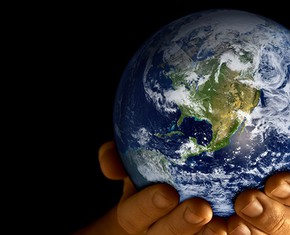The views expressed in our content reflect individual perspectives and do not represent the authoritative views of the Baha'i Faith.
Lately I’ve tried to think more intentionally and carefully about how I expend my energy—almost like conducting an energy inventory of sorts.
This reflection has made me pay more attention to the way I interact with family members, how I talk to myself and, with a special focus, the nature of my friendships.
I’ve pondered how to choose friends who enrich and push me to develop the best parts of who I am. I have wondered how to be more generous, to build trust, love harder, and share more humbly. In my reflections I have identified one looming threat as especially prevalent in identifying clear answers to these questions: individualism.
The Baha’i teachings warn us all about developing an individualistic preoccupation with ourselves:
The mass of the people are occupied with self and worldly desire, are immersed in the ocean of the nether world and are captives of the world of nature … – Abdu’l-Baha, Selections from the Writings of Abdu’l-Baha, p. 282.
One of my goals involves growing friendships that are not infected with a self-centered, materialistic tone. A few passages from the Baha’i writings have brought to light fresh ideas about the true essence of friendship. This first quote describes a glowing standard for human relationships:
It is the animal proclivity to look after one’s own comfort. But man was created to be a man—to be fair, to be just, to be merciful, to be kind to all his species, never to be willing that he himself be well off while others are in misery and distress. This is an attribute of the animal and not of man. Nay, rather, man should be willing to accept hardships for himself in order that others may enjoy wealth; he should enjoy trouble for himself that others may enjoy happiness and well-being. This is the attribute of man. This is becoming of man. Otherwise man is not man—he is less than the animal. –Abdu’l-Baha, The Promulgation of Universal Peace, p. 102.
Human nature naturally comes up when thinking more deeply about ideal expectations for friendship. Baha’is believe that while we are created noble, we have both a lower and a higher nature within us. Though we have some natural tendency to limit our focus to our own selves, we are not bound to this limitation. We can rise above it, in fact, we are intended to rise above our animal nature. In friendship this means we can be giving, compassionate and even sacrificial. We can be much more generous and selfless than our animal nature implies or allows:
Be kind to all peoples; care for every person; do all ye can to purify the hearts and minds of men; strive ye to gladden every soul. To every meadow be a shower of grace, to every tree the water of life; be as sweet musk to the sense of humankind, and to the ailing be a fresh, restoring breeze. Be pleasing waters to all those who thirst, a careful guide to all who have lost their way; be father and mother to the orphan, be loving sons and daughters to the old, be an abundant treasure to the poor. Think ye of love and good fellowship as the delights of heaven, think ye of hostility and hatred as the torments of hell. – Abdu’l-Baha, Selections from the Writings of Abdu’l-Baha, pp. 244-245.
This encourages me to try and better familiarize myself with the needs of my friends—actually, to be more careful and sensitive to the needs of everyone I meet, and try to alleviate whatever need I can for each and every one of them.
However, this needs to be balanced with a focus on the good within each person. Sometimes when trying to be aware of the needs of other people we can fall into the trap of pity. Pity obviously becomes a barrier to building a genuine and healthy relationship with someone. To avoid this risk for myself, remembering human frailty and fault as being natural seems to be a logical step.
Believing that we all have both a higher and a lower nature allows me to recognize that when I support one of my friends through a challenge, it does not mean that I am better than whichever friend I am helping. The Baha’i writings suggest that looking at the good within our friends is actually the easiest way to love them:
One must see in every human being only that which is worthy of praise. When this is done, one can be a friend to the whole human race. If, however, we look at people from the standpoint of their faults, then being a friend to them is a formidable task. – Abdu’l-Baha, Selections from the Writings of Abdu’l-Baha, p. 169.
Cleanse ye your eyes, so that ye behold no man as different from yourselves. See ye no strangers; rather see all men as friends, for love and unity come hard when ye fix your gaze on otherness. – Ibid., p. 24.
This last passage implies that friendship is much vaster than many of us may believe. Not only is there no room for bias, but this passage also implies that friendship can be extended to so many more people than I have imagined sustainable. In my mind friendship has always been something that requires time and energy. After reading these passages I am left wondering if maybe a wider variety of friendships exist than I have been taught to conceive. Some of our friendships are long term and sustained, while maybe others that only last for brief moments—perhaps friendship can also be simply offering to remedy the pain of another person.
















Comments
Sign in or create an account
Continue with Googleor